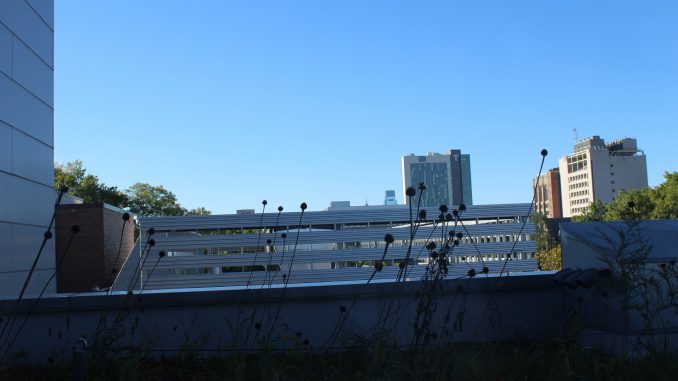
An increase in programs and events focused on sustainability at Temple have aimed to raise awareness about the university’s impact on the environment. In line with this way of thinking, Temple has promised to be carbon-neutral by 2050.
“Carbon-neutral means that the heat and electricity needed to run the building does not generate carbon dioxide or other greenhouse gas emissions onsite,” Robert Ryan, an engineering professor at Temple, wrote in an email.
In order to be carbon-neutral, the university has to have a net-zero carbon footprint, said Kathleen Grady, the director of the Office of Sustainability.
“Our campus’ biggest carbon footprint is energy, the heating and cooling of buildings,” said Laura Toran, a professor in the Earth and environmental science department.
The office has a climate action plan, which Grady said includes “retro-fitting” older buildings on Main Campus to make them more energy efficient. The new buildings are being designed to achieve LEED certification.
The United States Green Building Council, an organization dedicated to increasing sustainability in buildings, designed LEED certification to evaluate the environmental performance of a building, according to its website.
Ryan is the leader of the engineering team of the Tiny House project, which was designed by Temple students over a year ago. It’s being built by students and faculty from landscape, horticulture, architecture and engineering. The Office of Sustainability is collaborating with several academic departments on the project.
The tiny house is carbon-neutral, Ryan said, adding that it is “off-grid” — meaning it relies on no electrical power.
“The only power it has is from the solar panels installed on the roof,” Ryan said. “The only source of heat is by the sun warming barrels of water which will then radiate their heat into the building.”
The tiny house, on Broad and Diamond streets, will be used as a meeting space, and is available for tours to interested students. It also holds food demonstrations, and is a spaced used to teach people about gardening.
“I think it’s a really fun project to have so we can teach people about green design on campus,” Grady said.
Going carbon-neutral would also mean taking a look at the way students get to campus, Grady said.
“Temple is located in an urban area, well-serviced by transit,” she said. “Philadelphia is also one of the greatest cities in the country to bike, because it’s very flat.”
Temple was recognized by the League of American Bicyclists as a bike-friendly university, but it is still working to improve, Grady said. Last year, Temple added more than 200 bicycle racks on Main Campus, and in January, the university will build covered bicycle storage on Main Campus, she added.
The Office of Sustainability is also working to give students access to inexpensive bicycles by collecting abandoned bicycles and selling them at lower costs, after holding them for a year to make sure nobody claims them, Grady said. She added that students also get a discount at Indego Bike Share.
At the start of the school year, the office gave free breakfast to bikers, who rode past the Student Center. It is also working to inform students about bicycle safety through urban riding classes.
Grady said it’s important to note that these aren’t just the efforts of the Office of Sustainability, but of the whole university.
Megan Milligan can be reached at megan.milligan@temple.edu.


Be the first to comment